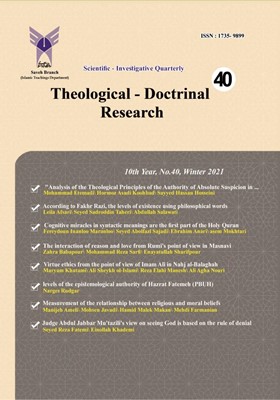-
-
List of Articles
-
Open Access Article
1 - Analysis of the Theological Principles of the Authority of Absolute Suspicion in the Science of the Principles of Jurisprudence
hormoz asadikohbad -
Open Access Article
2 - According to Fakhr Razi, the levels of existence using philosophical words
Leila Afsari -
Open Access Article
3 - Cognitive miracles in syntactic meanings are the first part of the Holy Quran
فریدون اینانلو مرانلو -
Open Access Article
4 - The interaction of reason and love from Rumi's point of view in Masnavi
zahra babapour mohammad reza sarfi Enayatullah Sharifpour -
Open Access Article
5 - Virtue ethics from the point of view of Imam Ali in Nahj al-Balaghah
Maryam Khatami -
Open Access Article
6 - levels of the epistemological authority of Hazrat Fatemeh (PBUH)
Narges Rudgar -
Open Access Article
7 - Measurement of the relationship between religious and moral beliefs
manijeh ameli mohsen javady hamid malekmakan madi farmanyan -
Open Access Article
8 - Judge Abdul Jabbar Mu'tazili's view on seeing God is based on the rule of denial
sed reza fatemi Einollah khademi -
Open Access Article
9 - The role of religious beliefs and doctrines In compliance with the contractual obligation
shahnaz seifollahi mahmud ghayumzadeh Hossein HabibiTabar
-
The rights to this website are owned by the Raimag Press Management System.
Copyright © 2017-2026







